To Be Young, Gifted, Secular, and Black
Black youth who reject organized religion don’t have the social and economic benefits of white privilege to blunt their “apostasy.”
ALTHOUGH IN THE UNITED STATES young millennials lead the growing wave of “nones” (those who answer “none” when asked their religious affiliation), there has been little mainstream media coverage of secular youth of color. Being nonreligious is just one of many intersectional identities that make these nones outliers. Like their religious peers, college-bound secular youth of color face the challenge of navigating institutional racism in historically white-dominated colleges and universities and of adjusting to academic climates where they may never have a professor or dean who looks like them. Compounding matters has been a lack of visible commitment on the part of secular organizations to the social justice and educational equity issues most relevant to communities where black and Latino youth are being incarcerated in greater numbers.* Responding back in 2013 to the absence of any such effort, Black Skeptics Los Angeles (BSLA) launched the First in the Family Humanist Scholarship fund (in collaboration with Atheists United, the American Humanist Association, and Foundation Beyond Belief) to provide support for foster care, homeless, undocumented, LGBTQ, and system-involved youth of color—youth populations that have historically been shut out of college access. In 2015 BSLA partnered with the Freedom From Religion Foundation (FFRF) on the Catherine Fahringer scholarship for secular youth of color—the only national scholarship of its kind.
So what motivates some millennial youth of color to embrace secularism, atheism, agnosticism, or humanism? I asked four outstanding graduates of the classes of 2015 and 2016 to reflect on their views.
* In May the AHA launched the Black Humanist Alliance, an adjunct organization that will promote racial justice and solidarity between the black and humanist communities.
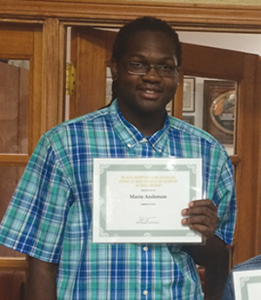 MARIO ANDERSON graduated this year from King Drew Magnet High School of Medicine and Science in South Los Angeles. He is a recipient of the 2016 First in the Family Humanist Scholarship and will attend the University of California, Los Angeles in the fall.
MARIO ANDERSON graduated this year from King Drew Magnet High School of Medicine and Science in South Los Angeles. He is a recipient of the 2016 First in the Family Humanist Scholarship and will attend the University of California, Los Angeles in the fall.
The reason I associate myself with nonreligious beliefs is because I realized that there is no invisible source of support that sits on a cloud and offers love and protection to us. This conclusion was derived from personal experience after years of struggling with my beliefs. I always wished I wasn’t visually impaired and scrawny. I prayed for years to not be bullied because of my size, race, and the fact that I wasn’t straight. After nothing changed, it became clear that some invisible all-powerful person, who loves me but who wouldn’t help me in any way until I died, sounded ridiculous. I did and do understand that I am the master of my fate, and I am the only one who can make my life better despite all the challenges I was born with. I am happier with this resolution and feel that if others adopted it, they too would be much better off.
I will be attending the University of California, Los Angeles in the fall for my freshman year. Following my UCLA education, my future ambitions are to become fluent in Spanish and help members of my community as a physician. I want to start a program in my community that helps less fortunate people who don’t have health insurance.
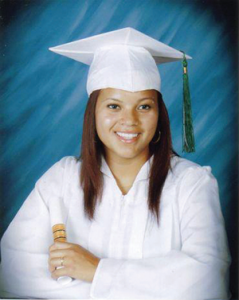 MIANI GIRON received her B.S. in biology from Syracuse University this year and will attend medical school at UCLA in the fall. She is a former foster care youth, graduate of Gardena High School in South Los Angeles, and an alumnus and former president of the Women’s Leadership Project, feminist/humanist mentoring program.
MIANI GIRON received her B.S. in biology from Syracuse University this year and will attend medical school at UCLA in the fall. She is a former foster care youth, graduate of Gardena High School in South Los Angeles, and an alumnus and former president of the Women’s Leadership Project, feminist/humanist mentoring program.
I began to question the authenticity of religion in 2012, the year I started my undergraduate program at Syracuse. As an elective, I registered for a Women’s and Gender Studies course, which exposed me to the reality of patriarchy. With this newfound knowledge, I was able to recognize patriarchal values throughout our society, including in its most widely distributed “nonfiction” book, the Bible. I found such patriarchal notions within a “holy” text to be extremely hypocritical and eventually found myself straying away from organized religion, specifically Christianity. After critical analysis, I’ve come to view organized religion as a source of revenue and as a system that perpetuates patriarchy by forbidding autonomy, especially for women. While I no longer identify as a Christian, I still have curiosity with regards to the existence/nonexistence of a higher power—but I’ve come to accept that I will never know definitively and thus identify as an agnostic. I like to think of myself as being neutral in this matter and will continue to be so throughout my medical education at the David Geffen School of Medicine at UCLA. Until I come across a particular knowledge or experience that sways me one way or another (that is, belief or disbelief), I am quite content pursing a medical degree as an agnostic.
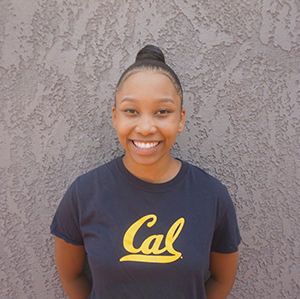 SABRINA HARPER recently graduated from Robert Milikan High School in Long Beach, California. She is the recipient of a 2016 FFRF/Catherine Fahringer scholarship and will attend UC Berkeley in the fall.
SABRINA HARPER recently graduated from Robert Milikan High School in Long Beach, California. She is the recipient of a 2016 FFRF/Catherine Fahringer scholarship and will attend UC Berkeley in the fall.
While others choose to believe in a “God,” I choose to believe in myself and in tangible reasons for the things that happen in our lives. The greatest technological innovations and basic everyday occurrences weren’t created by faith but by things physically and scientifically seen and proven. Believing in anything more is not only irresponsible and unrealistic, but dangerous as well. These “religions” are the basis for every type of discrimination out in the world today. Religions create more problems than they could ever solve.
I live in a community where white Catholics are the norm. Living in one of the very few black households in the neighborhood, I’ve noticed that many are either ignorant or inattentive to the issues of the black community. That’s something I would like to change. Many black issues such as incarceration rates, unequal pay and representation in companies, and blatant racism are being ignored due to the lack of awareness and support in my community. If we simply educated our communities, we would not only increase support in numbers, but also increase the support of races that objectify African Americans in the first place. If those who commit the racist acts see their peers supporting black causes, points of view could change, racism and violence could end, and the world would be a better place. I know it isn’t that simple, but it’s a place to start.
The equality of all, no matter what race, sexual orientation, or gender, is an ideology that should become part of our way of life. Humanism is a practice that could fully address social issues and make the world stronger as a whole. It could eliminate all faults within our society economically, socially, and politically. Black CEOs would be a common occurrence, and women would get the same wages as men. There wouldn’t be a need for the “Black Lives Matter” movement because everyone would know that all lives matter. A black person getting shot by the cops wouldn’t automatically be seen as a racist vendetta. Humanism is the key to fixing us and making our society the best it can be.
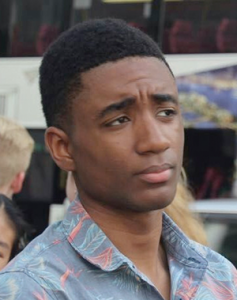 KOLA HEYWARD-ROTIMI is the recipient of a 2016 FFRF/Catherine Fahringer scholarship sponsored by Black Skeptics Los Angeles. He graduated from North Carolina School of Science and Mathematics and will be attending Amherst College in the fall.
KOLA HEYWARD-ROTIMI is the recipient of a 2016 FFRF/Catherine Fahringer scholarship sponsored by Black Skeptics Los Angeles. He graduated from North Carolina School of Science and Mathematics and will be attending Amherst College in the fall.
Faith is something that has stayed on people’s minds for millennia. Something about belief—belief in a higher power, belief in a superior leadership position, or belief in the environment itself—ensnares our minds. For someone who identifies as secular, I care quite a bit about the role religion and faith plays in our society. I believe that my concern about how non-secular thought affects people’s worldviews and actions stems from how I was raised. In a household where secular thought was the norm since I was a child, I found it easier to learn about spirituality in its many forms. I not only identify as a secular person but as an African American, which brings into play two different cultural aspects that contrast with mainstream society’s view. Secular people are rarely seen in the media as people of color, let alone a young black man raised by an African-American mother and a Nigerian-American father in a nonreligious household. One of the biggest lessons I learned growing up is to question everything. Everything was up for debate, even the idea of not believing in religion.
I was never convinced to personally believe in a religious system. Even so, exploring the significance of religious systems sparked my interest in the reasons why people decide to believe in a higher power and the varied ways people express their belief. These questions have kept me interested in learning about religion for years, and I incorporate these questions heavily in my fictional writing. Most of my fiction takes place in a unified fictional universe. A central conflict stems from debates about the differences between “good” and “bad” faith, how religion can be used to advance personal agendas, and the influence of religion on the making of civilizations.
In my next few years at Amherst College, I plan on continuing to ask questions concerning religion and its role in peoples’ lives. Creative writing will be a large outlet for this process, and I hope to publish the trilogy of Afro-Asian-inspired fantasy novels I’m developing. I also want to give underprivileged students the opportunity to prove their scientific assumptions like I do and to come to their own conclusions. I will attempt to achieve this by creating a nonprofit organization dedicated to improving STEM (science, technology, engineering, and math) education in communities lacking educational resources worldwide.
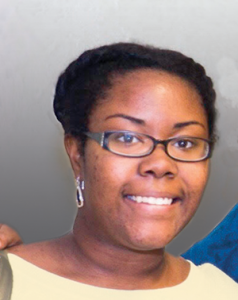 DJENNE THOMAS is a native of Atlanta, Georgia, and the daughter of Mandisa Thomas, president of Black Non-Believers, Inc. Djenne is pursuing an undergraduate degree at Johnson and Wales University and recently completed a two-and-a-half-month study abroad program in Germany, which she was able to achieve by maintaining a 4.0 GPA during her freshman year.
DJENNE THOMAS is a native of Atlanta, Georgia, and the daughter of Mandisa Thomas, president of Black Non-Believers, Inc. Djenne is pursuing an undergraduate degree at Johnson and Wales University and recently completed a two-and-a-half-month study abroad program in Germany, which she was able to achieve by maintaining a 4.0 GPA during her freshman year.
The reason I identify as an atheist is because there are no constraints on being one. You can be yourself, and you aren’t judged because of how/what you think about or other features. However, in the black community, to not be associated with any kind of religion is like having no life at all—where, basically, in order to accomplish self-fulfillment, you have to be associated with religion. If you’re not, you’re either permanently shunned or taunted.
It’s due to this type of mentality that I chose to start an LGBT club at my high school. Even though I don’t think there should have to be a specific place where people can be themselves, until the time comes when this isn’t the case, everyone deserves to at least belong somewhere where they can be themselves.
I am currently a sophomore at Johnson and Wales University in Providence, Rhode Island, where I plan to obtain a degree in international business. Although I’m not entirely sure what I want to do career-wise, I hope to pursue some form of foreign exchange.
As organized religion becomes less of a factor in the daily lives of Americans, secular youth of color will no doubt benefit from greater levels of acceptance of the nonreligious. Yet it remains to be seen how this next generation will redress the systemic inequities that confront people of color, who can’t bank on the wages of whiteness while being religious outsiders. These young leaders inspire us to imagine how humanism can be made intersectional, relevant, and real for a multicultural twenty-first-century United States.
